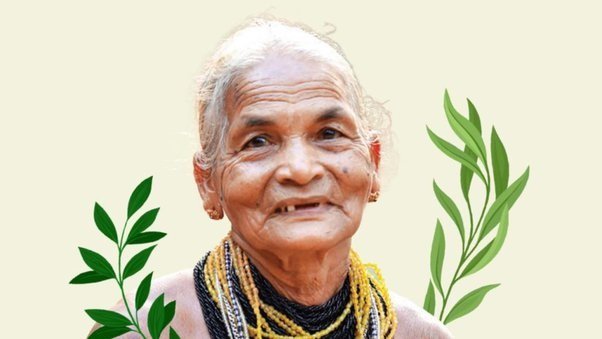
For over half a century, 83-year-old Tulasi Gowda has been the heart and soul of reforestation efforts in the Mastikatta range of Karnataka’s Honnalli village. Known as the “encyclopaedia of the forest,” Tulasi Ajji (grandmother) has dedicated her life to nurturing the earth, planting hundreds of thousands of trees, and helping regenerate many indigenous species. Her work has not only transformed the landscape but has also earned her one of India’s highest civilian honors, the Padma Shri.
A Life Rooted in the Earth
Tulasi Gowda’s journey began in the Agasur nursery of the forest department in Uttara Kannada district, where she started as a daily wage worker. Over 50 years, she became a pivotal figure in the department’s afforestation projects, using her deep knowledge of the forest to cultivate a diverse range of trees. Despite retiring 12 years ago, she remains deeply connected to the nursery, often visiting to plant rare seeds or saplings she finds.
Even with numerous accolades, including the Indira Priyadarshini Vrikshamitra Award in 1986 and the Kannada Rajyotsava Award in 1999, Tulasi Ajji’s humility remains intact. “I’m very happy that I got the Padma Shri, but I value the forests and trees more,” she said, her words a testament to her lifelong commitment to the environment.
Unparalleled Knowledge of the Forest
Tulasi Gowda’s expertise is not just recognized by her community but also by forestry professionals. Retired Indian Forest Service officer A.N. Yellappa Reddy, who noticed her potential early on, praised her unparalleled understanding of silviculture—the science of growing and cultivating trees. “Gowda could identify a mother tree of any species anywhere in the forest,” he said, highlighting her ability to determine the best seeds for regeneration based on their ecological value.
Her knowledge of the forest is so profound that she can identify over 300 medicinal plants, a skill passed down through generations in her Halakki Vokkalu tribe. This tribe, known for its intimate relationship with the forest, views Tulasi Ajji as a “vruksha devata” (goddess of trees), a title that reflects the deep respect she commands for her contributions to their traditional knowledge and the environment.
A Simple Approach to a Complex World
Despite her vast knowledge, Tulasi Ajji’s approach to forestry remains straightforward. When asked about growing a sapling, she offers simple, practical advice: “Each species has a different method to grow. We collect seeds, dry them, and then plant them.” Her methods, honed over decades, have resulted in the successful regeneration of numerous species, including teak, bamboo, and medicinal plants, which she meticulously nurtured before replanting in the forest.
Her contributions to forestry are immeasurable—so vast, in fact, that she has lost count of the number of trees she has grown. “Lakhs, maybe crores. Now, I can’t even find them,” she says with a modest smile.
A Life of Hardship and Resilience
Tulasi Gowda’s life has not been without hardship. Born into an economically disadvantaged family, she lost her father at a young age and began working alongside her mother at the nursery. Married off at the tender age of 10 or 12, she faced further challenges when she lost her husband in her 50s. Yet, her resilience saw her through 35 years as a daily wage worker before being recognized with a permanent position in the forest department, where she continued her invaluable work for another 15 years.
Her story is a powerful reminder of the importance of indigenous knowledge in environmental conservation. “We need forests. Without forests, there is no water, no crops, the sun becomes unbearably hot. If forests thrive, the state would as well,” Gowda wisely notes.
Legacy of a Green Guardian
Tulasi Gowda’s legacy is one of dedication, resilience, and an unyielding love for the earth. Her life’s work stands as a testament to the crucial role indigenous knowledge plays in preserving biodiversity and combating climate change. As the world grapples with these pressing issues, Tulasi Ajji’s wisdom and example offer a guiding light, showing that true conservation begins with understanding and respecting the natural world around us.

